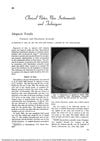
Nanocarriers with plant extracts show promise for safe and effective hair growth treatment.
 October 2023 in “Georgetown medical review”
October 2023 in “Georgetown medical review” Finasteride and Dutasteride can improve hair growth in male baldness but may cause temporary sexual dysfunction and possibly affect fertility.
 October 2023 in “Biomaterials”
October 2023 in “Biomaterials” Nanotechnology could improve hair regrowth but faces challenges like complexity and safety concerns.
 October 2023 in “Journal der Deutschen Dermatologischen Gesellschaft”
October 2023 in “Journal der Deutschen Dermatologischen Gesellschaft” Pregnancy can trigger severe rosacea, which may be treated with antibiotics and steroids, but there's no clear treatment guideline.
 July 2023 in “Regenerative Therapy”
July 2023 in “Regenerative Therapy” Stem cell and platelet-rich plasma therapies show promise for COVID-19 related hair loss, but more research is needed.
 June 2023 in “Journal of cosmetic dermatology”
June 2023 in “Journal of cosmetic dermatology” Both DPCP alone and with PRP are effective and safe for treating severe alopecia areata.
 May 2023 in “Journal of managed care & specialty pharmacy”
May 2023 in “Journal of managed care & specialty pharmacy” Alopecia areata causes hair loss and life quality issues; current treatments are often unsatisfactory, but new drugs like JAK inhibitors show promise.
 October 2022 in “IntechOpen eBooks”
October 2022 in “IntechOpen eBooks” Hair loss due to scarring can be treated by reducing inflammation, removing scar tissue, and transplanting hair. The Follicular Unit Extraction technique is effective but requires skill and time. Future focus should be on scar-less healing methods.
 March 2022 in “Wound practice & research”
March 2022 in “Wound practice & research” New treatments for alopecia areata show promise, but standardized guidelines are needed.
 September 2021 in “VNU Journal of Science: Medical and Pharmaceutical Sciences”
September 2021 in “VNU Journal of Science: Medical and Pharmaceutical Sciences” Platelet-rich plasma, which has growth factors, is used in many medical fields and can promote tissue repair, stimulate hair growth, and increase hair density.
April 2017 in “Al-Azhar Medical Journal” PRP is an effective and safe treatment for alopecia areata.
 7 citations,
February 2022 in “Journal of Cosmetic Dermatology”
7 citations,
February 2022 in “Journal of Cosmetic Dermatology” Injecting vitamin D3 into the skin is an effective treatment for patchy hair loss.
75 citations,
September 1971 in “British Journal of Dermatology” Both steroids effectively promote hair growth for at least 9 months.
Alopecia areata is an autoimmune disease that targets hair follicles.
2 citations,
June 2009 in “Journal of the American Academy of Dermatology” The treatment didn't work for the woman's hair loss and skin darkening.
 11 citations,
March 2018 in “Anais Brasileiros de Dermatologia”
11 citations,
March 2018 in “Anais Brasileiros de Dermatologia” Betamethasone can effectively treat alopecia areata.
11 citations,
April 1997 in “International Journal of Dermatology” Using tretinoin with triamcinolone acetonide helps treat alopecia areata.
18 citations,
December 2015 in “PubMed” Intralesional triamcinolone is more effective than topical betamethasone for treating localized alopecia areata.
6 citations,
December 2015 in “Journal of Dermatological Case Reports” Intradermal testing can better detect corticosteroid allergies than patch testing.
 January 2012 in “Yearbook of Dermatology and Dermatologic Surgery”
January 2012 in “Yearbook of Dermatology and Dermatologic Surgery” Some African American women experience central scalp hair loss, often linked to a history of fungal scalp infection.
 22 citations,
April 2011 in “Anais Brasileiros de Dermatologia”
22 citations,
April 2011 in “Anais Brasileiros de Dermatologia” Hair transplants can lead to hair loss from lichen planopilaris, and patients should be tested and wait two years before the procedure.
 20 citations,
January 2012 in “International journal of trichology”
20 citations,
January 2012 in “International journal of trichology” Steroids are the best treatment for Alopecia Areata with few side effects.
 12 citations,
September 2020 in “Journal of cosmetic dermatology”
12 citations,
September 2020 in “Journal of cosmetic dermatology” Trichoscopy is useful for diagnosing and monitoring alopecia areata treatment.
 165 citations,
January 2014 in “Dermatology Research and Practice”
165 citations,
January 2014 in “Dermatology Research and Practice” Zinc is effective for treating various skin conditions, including warts and acne.
23 citations,
February 2021 in “Dermatologic therapy” Some treatments like pentoxifylline with topical corticosteroids might work for alopecia areata, but more research is needed to find the best one.
5 citations,
July 2020 in “Recent patents on inflammation & allergy drug discovery” Childhood Alopecia Areata causes hair loss and requires varied treatments, with psychological support being crucial.
 April 2018 in “Dermatologic Surgery”
April 2018 in “Dermatologic Surgery” A new surgical technique using vellus hair grafts effectively treated vitiligo without causing unwanted hair growth.
 22 citations,
March 1963 in “Archives of dermatology”
22 citations,
March 1963 in “Archives of dermatology” A woman regrew her hair significantly using a corticosteroid cream with a plastic cover.

Botulinum toxin type A significantly reduces scalp psoriasis severity compared to placebo.
 4 citations,
January 2019 in “Annals of dermatology/Annals of Dermatology”
4 citations,
January 2019 in “Annals of dermatology/Annals of Dermatology” Changing hairstyles can help hair regrow in children with hair loss from tight braids or ponytails.





















